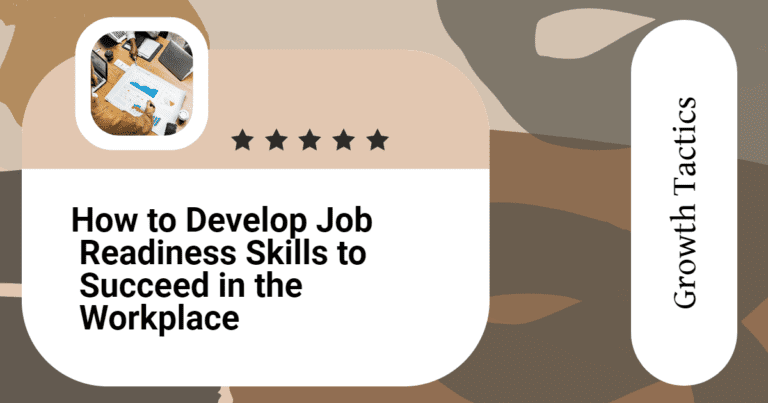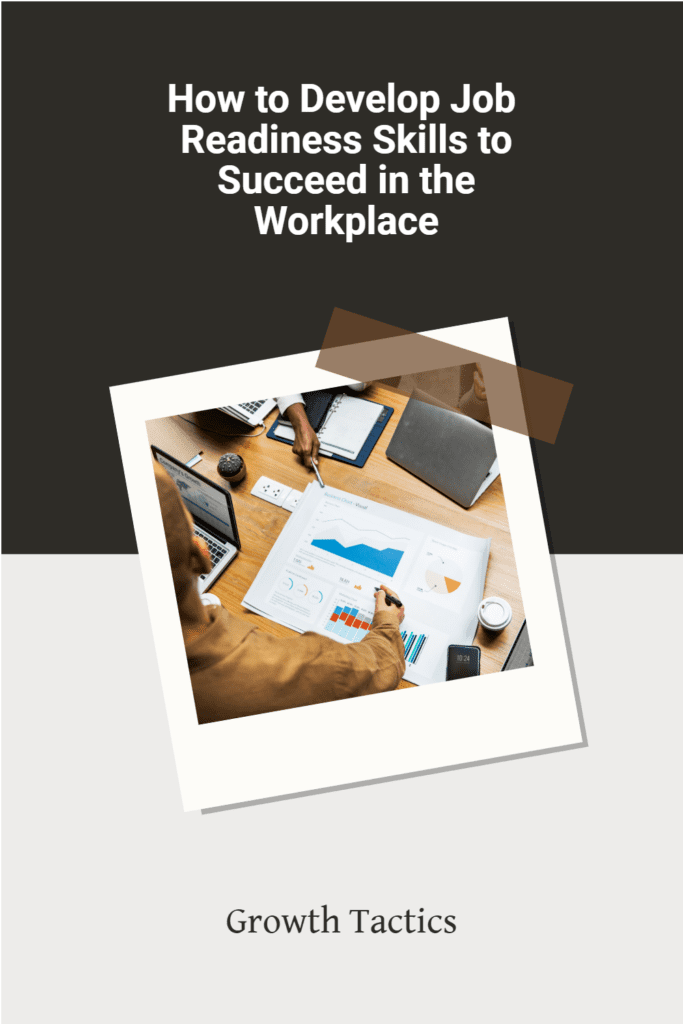Are you ready to embark on your journey towards a successful career? One crucial aspect that can make or break your professional growth is having the right job readiness skills. In this article, we will explore the importance of these skills and provide you with tips on how to develop them. Whether you are a recent graduate or a job seeker looking to enhance your employability, this article is worth reading.
Jump To Section
What are Job Readiness Skills?
Job readiness skills, also known as workplace readiness skills, are a set of essential abilities that allow individuals to succeed in the workplace. These skills go beyond technical expertise and encompass a range of personal qualities and attributes that are highly valued by employers. Job readiness skills include effective communication, problem-solving, time management, adaptability, teamwork, and self-discipline.
Why are Job Readiness Skills Essential in the Workplace?
Employers look beyond technical skills when evaluating potential employees. They seek individuals who possess job readiness skills because these skills contribute to a productive and harmonious work environment.
Employers value job readiness skills because they contribute to a productive and harmonious work environment. These skills enhance your overall effectiveness and ensure you can thrive in your role.
The Benefits of Workplace Readiness Skills
Developing and demonstrating workplace readiness skills can bring numerous advantages to both individuals and organizations. Here are some key benefits:
-
Increased Employability: Possessing job readiness skills sets you apart from other candidates and enhances your chances of securing employment. Employers are more likely to hire individuals who possess the necessary soft skills to excel in the workplace.
-
Career Advancement Opportunities: Workplace readiness skills are essential for career growth and advancement. By mastering these skills, you position yourself as a valuable asset to the organization, opening doors to promotions, higher-level positions, and increased responsibilities.
-
Enhanced Professional Relationships: Effective communication, teamwork, and collaboration skills foster positive relationships with colleagues, superiors, and clients. This improves workplace dynamics, encourages teamwork, and increases job satisfaction.
-
Increased Job Satisfaction: Developing job readiness skills improves your overall competence and confidence in the workplace. As a result, you are more likely to feel satisfied and fulfilled with your job, leading to greater job satisfaction and happiness.
-
Improved Productivity: With strong time management, organization, and problem-solving skills, you can work more efficiently and effectively. This increased productivity benefits both you and the organization, allowing you to accomplish tasks more quickly and accurately.
-
Better Adaptability to Change: Workplace readiness skills, such as adaptability and flexibility, enable you to navigate changing work environments and emerging technologies with ease. This ability to adapt positions you as a valuable resource during times of organizational change or restructuring.
-
Enhanced Leadership Potential: Developing job readiness skills, including initiative, critical thinking, and self-discipline, can help you demonstrate leadership potential. These skills are highly valued, particularly when it comes to taking on managerial or supervisory roles.
-
Improved Problem-Solving Abilities: Workplace readiness skills enable you to approach challenges with a strategic mindset. By developing your problem-solving abilities, you can identify and resolve issues more effectively, leading to improved outcomes and greater success in your work.
While the specific benefits may vary based on the nature of the job, industry, and individual circumstances, these general benefits highlight the importance of workplace readiness skills in today’s competitive job market.
How to Develop Job Readiness Skills
Now that you understand the importance of job readiness skills, let’s delve into how you can develop these skills to excel in the workplace.
1 Initiative: Taking the First Step
Taking initiative demonstrates your drive and willingness to go above and beyond. A proactive approach and a can-do attitude can set you apart from other candidates. Take on additional responsibilities, seek out learning opportunities, and engage in projects that challenge you. By stepping outside of your comfort zone, you can develop valuable skills and demonstrate your potential to employers.
2 Pre-ETS: Preparing for Employment
Pre-Employment Transition Services (Pre-ETS) are designed to help job seekers with disabilities develop the skills they need to succeed in the workplace. These services offer comprehensive support, including vocational training, job exploration, and work-based learning experiences. Pre-ETS can equip individuals with the necessary job readiness skills and provide them with a competitive edge in the job market.
3 Workplace Readiness Training: Gaining Essential Skills
Workplace readiness training programs are specifically designed to enhance individuals’ job readiness skills. These programs cover various topics, including effective communication, problem-solving, and time management. By participating in workplace readiness training, you can acquire the skills employers seek and gain confidence in your ability to thrive in a professional setting.
4 Effective Communication: The Power of Verbal and Written Skills
Strong communication skills are essential in any workplace. The ability to express yourself clearly and concisely, both verbally and in writing, enables effective collaboration and understanding. Practice active listening, refine your vocabulary, and develop your written communication skills through regular writing exercises. These communication skills will enhance your interactions with colleagues, clients, and supervisors.
5 Time Management: Making the Most of Your Time
Time management is crucial for maintaining productivity and meeting deadlines. Develop strategies to prioritize tasks, set goals, and allocate your time effectively. Use tools like calendars and to-do lists to stay organized, and be mindful of how you spend your time. By mastering time management, you can handle multiple responsibilities efficiently, impress employers with your productivity, and reduce stress.
6 Problem-Solving: Finding Solutions in the Workplace
Problem-solving skills are highly valued in the workplace. Employers seek individuals who can analyze complex issues, think critically, and develop creative solutions. Improve your problem-solving abilities by practicing active problem-solving techniques, such as identifying the root cause, brainstorming alternative solutions, and evaluating the pros and cons of each option. By honing your problem-solving skills, you can tackle challenges head-on and contribute to the success of your organization.
7 Self-Discipline: Staying Focused and Motivated
Self-discipline is the ability to stay focused and motivated, even when faced with distractions or challenging tasks. Cultivate self-discipline by setting clear goals, breaking them down into manageable steps, and creating a routine that supports your productivity. Learn to prioritize your activities, avoid procrastination, and develop a growth mindset. Self-discipline will help you stay on track and achieve your professional aspirations.
8 Instructional Resources: Enhancing Your Learning
Take advantage of the instructional resources available to you. Online courses, workshops, books, and mentorship programs can provide you with valuable knowledge and advice. Seek out learning opportunities that align with your career goals and focus on improving specific job readiness skills. Investing in your own development will pay off in the long run and position you as a valuable asset in any organization.
9 Adaptability: Thriving in a Changing Work Environment
In today’s rapidly evolving work environment, adaptability is essential. Embrace change, be open to new ideas, and develop a growth mindset. Demonstrate your flexibility and willingness to learn new skills by taking on diverse projects or roles. Employers value individuals who can adapt to new technologies, procedures, and work environments, as they contribute to the overall success of the organization.
10 Teamwork and Collaboration: Working Together Towards Success
Teamwork and collaboration skills are crucial for creating a cohesive and harmonious work environment. Foster positive relationships with your colleagues by actively participating in team activities, supporting others, and demonstrating empathy. Collaborate on projects, contribute to group discussions, and be receptive to feedback. By working well with others, you can achieve shared goals and contribute to a team’s success.
Summary: Key Takeaways
-
Job readiness skills, also known as workplace readiness skills, are essential for success in the workplace.
-
Key job readiness skills include effective communication, problem-solving, time management, adaptability, teamwork, and self-discipline.
-
Taking initiative, participating in Pre-Employment Transition Services (Pre-ETS), and engaging in workplace readiness training can help you develop these skills.
-
Focus on developing strong verbal and written communication skills, mastering time management techniques, and refining your problem-solving abilities.
-
Cultivate self-discipline, seek out instructional resources, embrace adaptability, and foster teamwork and collaboration.
-
By investing in the development of these skills, you can enhance your employability and position yourself for success in the workplace.
Developing job readiness skills is a journey that requires commitment and perseverance. By developing these skills, you can not only improve your chances of finding employment but also thrive in your chosen career. Remember, it’s never too late to start honing your job readiness skills. So take that first step, embrace opportunities for growth, and watch your professional success unfold.


